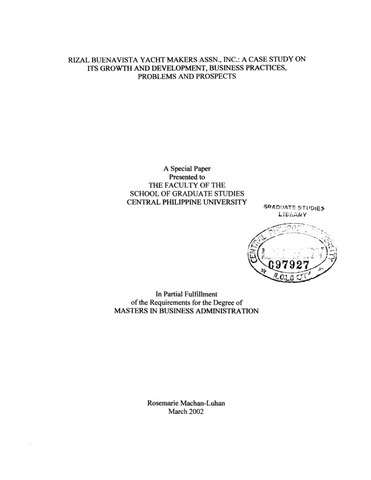Rizal Buenavista Yacht Makers Assn., Inc.: A case study on its growth and development, business practices, problems and prospects
Abstract
This study aimed to determine the growth and development of RBYMAI, its business practices, problems and prospects.
Conducted in March 2002, this descriptive research involved members of RBYMAI and account officers of government agencies assisting the association.
A structured interview schedule was used to gather data.
Frequency distribution and measures of central tendencies were the descriptive statistics used in the study. The study revealed that the association is composed of members individually engaged in miniature yacht making. Their skills in woodcarving is a legacy handed down from generations, which dates back in 1900s. They produced miniature yachts, frigates, clippers, galleons and sailboats made from soft wood such as “bita” or “kapok”. These products can be a collector’s item or a novelty item. The crude appearance of the product has a certain appeal to buyers who prefer native and natural product. The same has high export market potential.
The association was organized to address the concerns of yachtmakers such as the low buying price and the delayed payment of middlemen. The association served as a marketing arm and was able to assist its members increase their sales through trade fair participation and linkages with institutional buyers. Various government institutions assisted the association in its ventures.
Members did their own selling as well. Most of their products were sold outside of Guimaras, e.g., in Boracay which is an internationally renowned tourist destination. Peak sales were experienced during Christinas season and sales were better usually from July to December during which influx of foreign tourist such as European and Koreans to the island is high. Sales of members, however, were affected by stiff competition among themselves and the lack of working capital. Not all members can provide for their own working capital and resorted to cash advance payment from customers or borrowed money from private firms.
Most of the members were not legally registered although one third of them was into yachtmaking since the 70’s. All firms were categorized under micro size and were managed by the owners themselves or by a family member. Almost all of the firms have no paid workers, i. e., only family members helped in production and marketing. Production was done individually with one worker finishing the whole product. Members have generally, a small area of more or less 4 square meter in the vicinity of their residences serving as their workplaces. Members conducted their own quality control either by visual examination or based on their own set criteria or depending on the specification required by the buyer. The association also conducted quality control on the products submitted by the members for trade fair or exhibit. Infestation of molds or woodworm was the observed defect right after manufacturing and during prolonged storage. This affected quality of products and product rejection was experienced by almost one-third of the members. Wrong dimension was another cause of product rejection. To address the quality problem and the lack of working capital, the Provincial Government of Guimaras and other assisting agencies/entities pledged to provide the association with building, equipment and seed money. The building that was intended to serve as workplace, and the seed money were materialized. However, the kiln dryer intended to improve drying process and eliminate molds or woodworm infestation was not provided.
The study further revealed that the association, despite the external assistance received, was not very well managed. They lacked clear cut policies and while the implementation of existing ones was quite loose giving more elbow room for abuse of high ranking officials. This consequently led to demoralization, distrust, lack of cooperation and commitment among members. On the other hand, the attitude of members like the “kanya-kanya” or the self-centeredness and the refusal to adopt or change had created problems on quality, pricing, among others. This lack of teamwork among members and officers was an impediment to the growth of the association. Such became a vicious cycle that consequently became a hindrance to the growth and development of the association. Their most pressing problem during the study was related to marketing, and organization and management.
It is recommended that strengthening of the association be done. The association can be converted into a cooperative so that it can be regularly monitored and provided assistance by the Cooperative Development Authority (CDA), a government agency involved in cooperative development. The management should formulate clear-cut policies and the strict implementation of these policies should be observed. Members should be updated of the status of the organization and transparency should be observed to bring back the trust and confidence and eventually the cooperation and commitment so that both the organization and its members will grow and develop.
Description
Abstract only
Suggested Citation
Luhan, R. M. (2002). Rizal Buenavista Yacht Makers Assn., Inc.: A case study on its growth and development, business practices, problems and prospects (Unpublished Master's special paper). Central Philippine University, Jaro, Iloilo City.
Type
Special paperSubject(s)
Department
School of Graduate StudiesDegree
Master in Business AdministrationShelf Location
GSL Theses 650.072 L968
Physical Description
xv, 90 leaves


